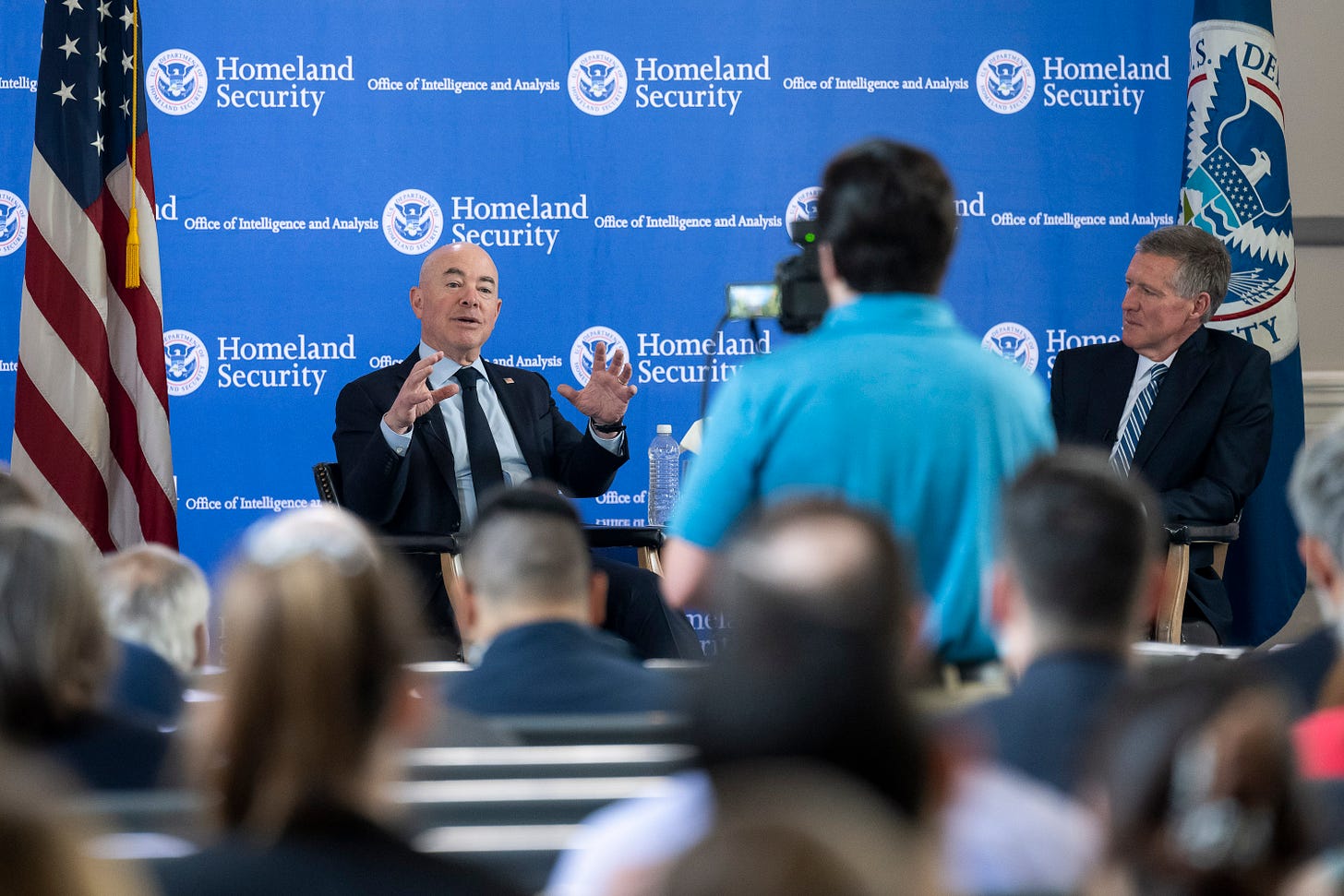U.S. Gov Finally Admits to Spying on Domestic Protests
Intel agencies monitor protests against Israel and the overturning of Roe v. Wade, among others
The FBI, Department of Homeland Security, and the National Counterterrorism Center are all surveilling and reporting on domestic protests, specifically the student demonstrations about the Israel-Hamas war and abortion-related protests at the Supreme Court, a top intelligence official admitted this week in testimony before Congress.
The intelligence community has been under significant pressure from Congress to monitor the pro-Palestinian protests, as I’ve previously reported. The FBI and NCTC have also taken it upon themselves to more closely scrutinize domestic protests in other areas, all on the pretext that they are looking for foreign influence.
Homeland Security’s intelligence agency has on multiple occasions tasked their intelligence collectors with gathering information on various protests, Ken Wainstein, the Department's Under Secretary for Intelligence and Analysis said in testimony before a House Homeland Security Subcommittee on Tuesday. Wainstein claimed that foreign governments (and other actors) were actively exploiting American protests to sow discord in the U.S. His remarks have not been previously reported.
“There have been numerous occasions where we have asked them [Homeland Security collectors as well as state and local authorities] to search, collect, and provide warnings about the possibility for violence developing around events of heightened tension, ranging from the January 6, 2021, attacks on the Capitol to the reaction to the Supreme Court’s decision in Dobbs v. Jackson Women’s Health Organization, and the mass gatherings in the aftermath of the October 7, 2023, Hamas attacks in Israel,” Wainstein said.
The Dobbs decision, which effectively ended the federal right to an abortion, spurred protests including in front of some Justices’ homes. The demonstrations stirred panic in Congress, which beefed up security for the Supreme Court, as I’ve reported.
Now protests over the Israel-Hamas war have led to a similar panic, as members of Congress demand that the intelligence community investigate foreign sponsorship of the demonstrations.
“So, for example, with the campus protests. We put guidance out, because that's a very sensitive, delicate situation,” Wainstein said. Wainstein also said that because of the acute sensitivity of the issue, his office had issued specific guidance on monitoring university protests, guidance that relates to homeland security law enforcement agencies like Homeland Security Investigations (HSI) and ICE, as well as state and local law enforcement and intelligence affiliates.
“With the campus protests, we put guidance out, because that's a very sensitive, delicate situation,” Wainstein said.
When asked by Rep. Dan Bishop if there was any “foreign malign influence” being exerted over the university protests, Wainstein said that it was an issue the intelligence community is working on.
“Let me just say that that is an issue that we in the intelligence community focus on, not just with this round of protests, but with all protests, because we're seeing that that is one of the entrees in our adversaries’ menu, right?” Wainstein said. “Try to foment agitation within the United States. Sow discord. We've seen that over and over. And one of the ways of doing that is to try to sort of sow disorder on the streets.”
Wainstein later equated foreign aspirations to sow disorder in the American political system to a “counterterrorism threat.” (The National Counterterrorism Center, which is part of the Office of the Director of National Intelligence, has also beefed up its intelligence collection and analysis of domestic extremist groups, particularly anti-government and anti authority groups, as I reported in May.)
“So, if a foreign nation state or a foreign terrorist organization is trying to foment discord within, with any groups here in the United States, that is by definition a counterterrorism threat, a counterintelligence threat,” Wainstein said.
But when it comes to specifics of whether there is any actual foreign influence over university protests, Wainstein played coy.
“So you put your finger on a very critical issue,” he said. “Obviously, if there were, that would be, if I was aware of anything, that'd be based on intelligence sources and methods…I couldn't speak about it in an unclassified context.” In other words, he’s not saying that there is any actual foreign involvement, more just raising the specter and instilling an atmosphere of fear — which, of course, provides justification for the domestic spying.
Despite the alarming admission that U.S. intelligence was spying on protestors, Congress didn’t question any of it. Too often, that’s how congressional oversight of the intelligence community works. Congress asks a question, an intelligence official says they can only talk about it in a classified setting, where they later brief the Congressperson — but not the American people who, lacking security clearances, remain in the dark. In this case, the public remains in the dark about something quite significant: the evidence upon which the intelligence community is basing its monitoring of American protesters.
Rep. Seth Magaziner gave up the game when during the hearing he lamented the way that Americans’ constitutional rights can make it difficult to disrupt domestic extremism threats.
“Unfortunately, we’re often talking about American citizens who have First Amendment rights as well,” Magaziner said.
The comment has to be seen to be believed:
— Edited by William M. Arkin


Presumably foreign influence somehow excludes AIPAC....
"“So, if a foreign nation state or a foreign terrorist organization is trying to foment discord within, with any groups here in the United States, that is by definition a counterterrorism threat, a counterintelligence threat,” Wainstein said."
Presumably that applies to writing Op-Ed's for the New York Times as well.
https://www.nytimes.com/2013/09/12/opinion/putin-plea-for-caution-from-russia-on-syria.html